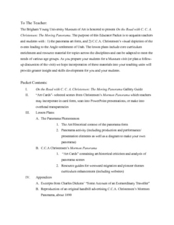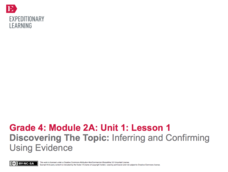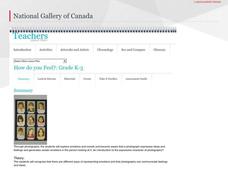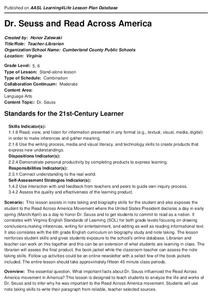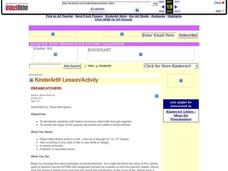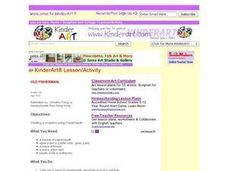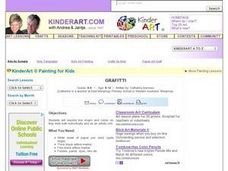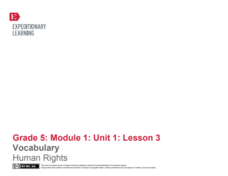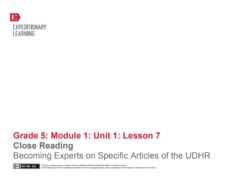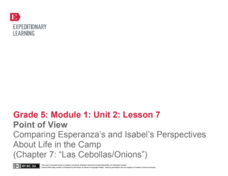Curated OER
The History of The Cyclorama and Moving Panorama
Here is a lesson designed to acquaint learners with two amazing forms of entertainment from the 19th century: The Cyclorama and the Moving Panorama. After seeing what these two contraptions were all about, pupils make their own version...
National Gallery of Canada
My First Print
Practice printmaking with a fun lesson. After observing images, class members use the listed materials, such as stamps and sponges, create their own prints. They experiment with layering, pressure, and paint colors.
Curated OER
Color Me Happy: Color, Mood, and Tone
Students examine how artists use color to set the tone of a painting. They analyze and discuss various paintings, complete a chart comparing the artists' color schemes and tones, and write a paragraph comparing two images.
Curated OER
Introduction to Ludwig van Beethoven
"Ode to la Tortilla" and "Ode to Joy"? Sure! Use Gary Soto's poem to introduce learners to the ode format. After examining the descriptive words Soto uses, class members study a poster of Ludwig van Beethoven, suggest words that describe...
EngageNY
Close Reading: Unpacking Specific Articles of the UDHR
Lesson 6 of this extensive unit finally has your class begin to work their way through specific articles from the text of the Universal Declaration of Human Rights (UDHR). Before examining the rights actually detailed in the document,...
EngageNY
Discovering the Topic: Inferring and Confirming Using Evidence
Allow your class to figure out what they will be studying through an inquiry-based anticipatory set that involves analysis of mystery documents and practice with making inferences. The lesson plan document includes a detailed description...
Film Foundation
The Day The Earth Stood Still: Film Language And Elements Of Style
In this, the third in a series of four resources that use Robert Wise's 1951 version of The Day The Earth Stood Still as the core text, young film makers examine the language of film including shot composition, camera angle, lighting,...
Johnny Mercer Foundation
Project-Based Songwriting
Project-based learning in a music theory class? Take note. Young songwriters compose, record, copyright, and promote their original songs. They even design their own CD cover.
EngageNY
Completing Reflection: Preparing a Poster for Presentation
Prewrite, plan, draft, revise, edit, share. Scholars complete a worksheet to reflect on how they used the writing process to improve their writing. They also draft plans for their scientific posters that they will display in an upcoming...
EngageNY
End of Unit Assessment: Fishbowl Discussion
Is it worth it? Scholars complete the end of unit assessment by participating in a fishbowl discussion to consider if the benefits of DDT outweigh the consequences. They reflect on their discussions by completing an exit ticket.
National Gallery of Canada
How Do You Feel?
Photographs can show a range of emotions. Discuss Dorothea Lange's photo Migrant Mother and a range of other images in relation to emotion. After the discussion, class members contribute to a set of photographs that express various...
National Gallery of Canada
My Upside-Down World!
M.C. Escher is famous for creating optical illusions. Examine this effect in several of his works and discuss the techniques involved. Inspired by the discussion, learners create an imaginary 3-D world inside of a box using various...
Curated OER
Dr. Seuss and Read Across America
What important facts about Dr. Seuss influenced the Read Across America movement...? This is the driving question of a research project that requires scholars to find information about Dr. Seuss' life and work. Class members write a...
Curated OER
Dreamcatchers
After reading a Native American legend about dreamcatchers, why not make some. This resource provides several good links that explain the legend of the dreamcatcher and step-by-step instructions for making them with the class. Tip: If...
Curated OER
Old Fisherman
Sculpting is a lot of fun and it stimulates multiple senses at once. Learners observe and then create a fisherman (or any person) out of paper clay. They mold and sculpt their clay until they have shaped a person. They then paint and...
Curated OER
Graffitti
Here is a fun way to encourage a cooperative classroom, drawing skills, and creative expression. Each child draws a design or shape on his paper, then he rotates to the next child's paper where he adds to the previous design. When the...
Media Smarts
Teaching TV: Television Techniques
As part of a five-lesson unit on how television uses technology and film techniques to communicate meaning, elementary students create their own media productions that demonstrate their understanding of these concepts.
EngageNY
Vocabulary: Human Rights
Your class continues to explore the history of the Universal Declaration of Human Rights. In addition to learning about the background of this text, learners work on the skill of identifying and understanding key academic vocabulary....
EngageNY
Building Background: A Short History of Human Rights
Before continuing to read the Universal Declaration of Human Rights, learners need to understand why and how this document was written. First, show and discuss a video from UNICEF to demonstrate the need for such a document. Then have...
EngageNY
Close Reading: Becoming Experts on Specific Articles of the UDHR
A continuation of the previous lesson, which is part of a larger group of lessons on human rights (see additional materials). Here, in Lesson 7, your class will explore more articles from the Universal Declaration of Human Rights. After...
EngageNY
Point of View: Comparing Esperanza's and Isabel's Perspectives About Life in the Camp (Chapter 7: "Las Cebollas/Onions")
Explore point of view and more with a Common Core-designed instructional activity. Learners experience different points of view by representing one of two characters from Esperanza Rising during a partner discussion. They must use...
Curated OER
Painting Package
Students use tools in a painting package to design tiles and create repeating patterns. They design a single tile using a 4 x 4 grid and experiment with changing the alignment of some of the tiles by rotating different areas.
National Gallery of Art
Impressive Prints
Explore printmaking with a discussion and project. Pupils first view and talk about various examples of prints and cover positive and negative space. They then come up with fictional animals and make prints of their creature using...
National Gallery of Canada
Reading Symbols
Introduce your upper-elementary students to printmaking. Class members view prints, select and research symbols in a piece, and create their own sets of prints using styrofoam trays. Pupils can wash off the paint on their trays to make...


